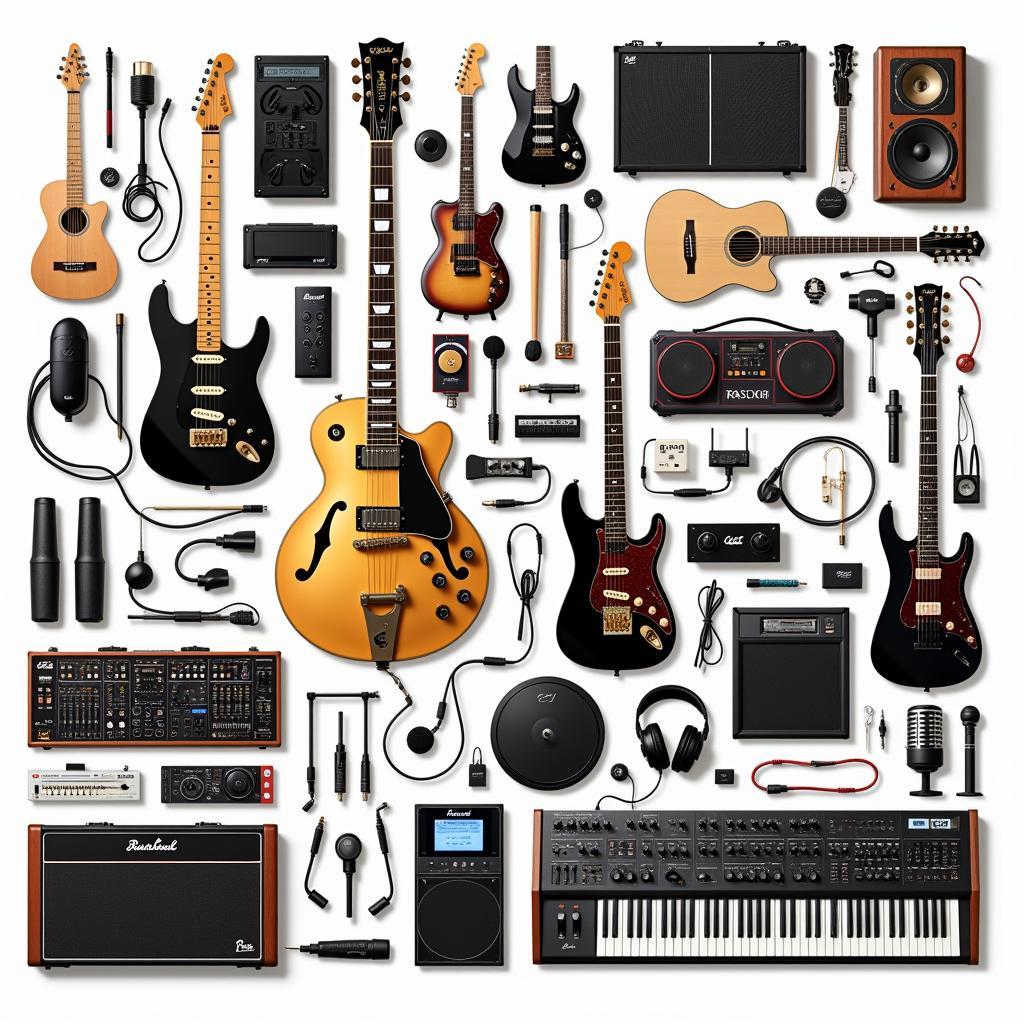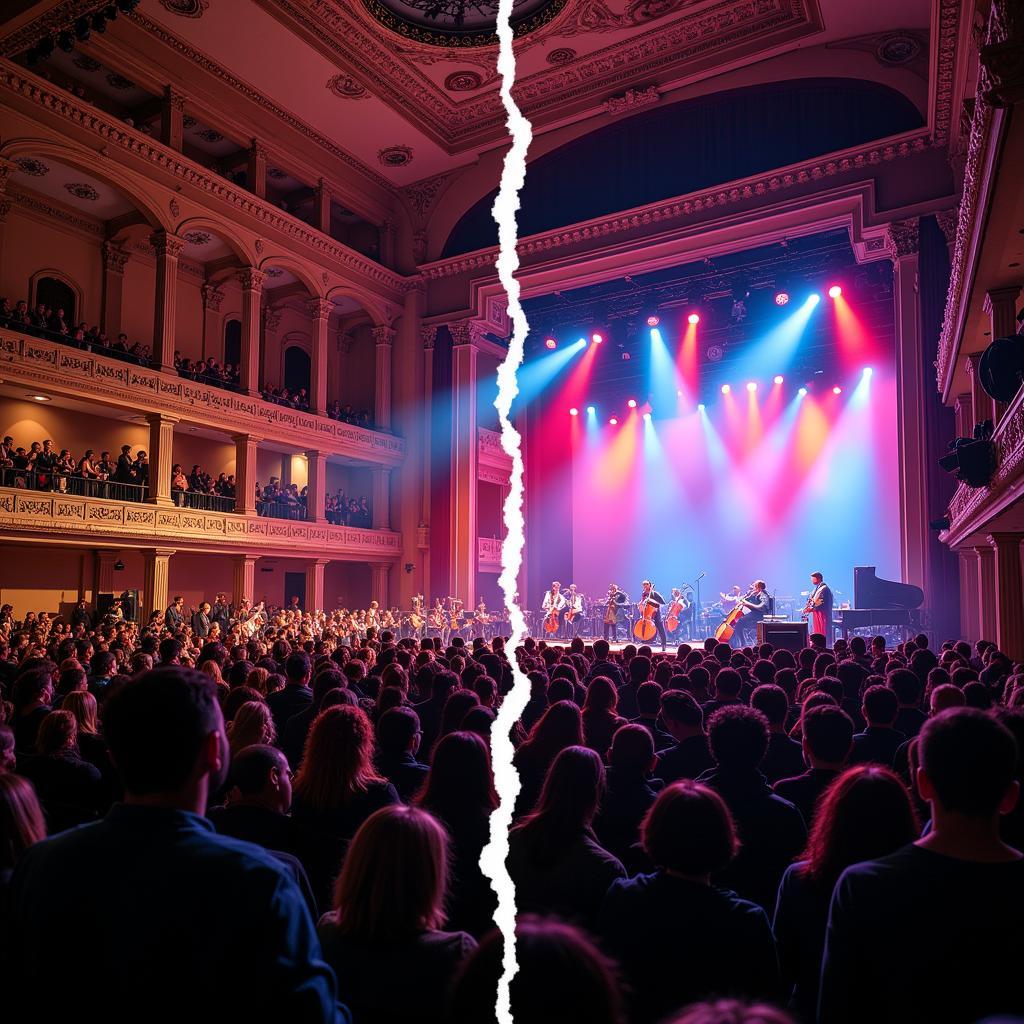Classical music and modern music represent distinct eras and styles in the vast world of music. While both forms offer unique artistic expressions, they differ significantly in their composition, instrumentation, social context, and overall impact on the listener. Understanding these differences can enrich your appreciation for both genres.
Exploring the Contrasts: Classical vs. Modern
Classical music, generally referring to the period from the late 18th to the early 19th century, emphasizes structure, harmony, and melody. Composers like Mozart, Beethoven, and Bach are celebrated for their complex compositions, often adhering to strict forms like sonatas and symphonies. The orchestra, with its diverse range of string, wind, brass, and percussion instruments, served as the primary medium for classical music.
Modern music, on the other hand, encompasses a wide range of genres that emerged in the 20th and 21st centuries, including jazz, blues, rock, pop, electronic music, and hip-hop. It often breaks free from the traditional rules of harmony and structure, exploring new sonic landscapes and experimenting with unconventional instruments and technologies. Modern music tends to be more improvisational and reflects the ever-evolving cultural and social influences of its time.
What Defines Classical Music?
Classical music is characterized by its intricate harmonies, complex melodies, and structured forms. It emphasizes balance, order, and precision, often evoking a sense of grandeur and formality. The use of acoustic instruments, primarily within the orchestral setting, creates a rich and nuanced sonic palette.
Key Characteristics of Classical Music:
- Emphasis on Harmony and Melody: Complex interplay between different musical notes.
- Structured Forms: Adherence to established forms like sonatas, symphonies, and concertos.
- Acoustic Instrumentation: Predominantly uses instruments like violins, cellos, flutes, oboes, and trumpets.
- Formal and Grand: Often associated with elegance, sophistication, and a sense of tradition.
What Defines Modern Music?
Modern music encompasses a broad spectrum of styles and genres, reflecting the diversity and rapid evolution of contemporary culture. It is often characterized by its experimentation with new sounds, rhythms, and technologies. Improvisation and individual expression play a significant role in many modern music genres.
Key Characteristics of Modern Music:
- Diverse Genres: Includes a wide range of styles, from jazz and blues to rock, pop, and electronic music.
- Experimentation with Sound: Explores new sonic territories using synthesizers, electronic instruments, and digital technologies.
- Improvisation and Individuality: Emphasis on personal expression and creative freedom.
- Reflection of Cultural Influences: Often reflects the social, political, and technological changes of its time.
 Đặc điểm của nhạc hiện đại
Đặc điểm của nhạc hiện đại
The Impact of Social Context
Both classical and modern music have been shaped by the social and cultural contexts in which they emerged. Classical music was often patronized by the aristocracy and reflected the values of order, hierarchy, and elegance prevalent in European society during the 18th and 19th centuries. Modern music, on the other hand, is often associated with social movements, cultural shifts, and technological advancements, reflecting the changing dynamics of the 20th and 21st centuries.
“Modern music’s ability to adapt and evolve is a testament to its deep connection with the pulse of society,” says renowned music historian Dr. Annabelle Harmon.
Classical Music vs. Modern Music: A Timeless Debate
The comparison between classical and modern music is a subject of ongoing discussion and debate. While some argue for the inherent superiority of classical music’s complexity and structure, others champion the innovative spirit and cultural relevance of modern music. Ultimately, the appreciation of music is subjective, and both genres offer unique artistic merits.
“Both classical and modern music offer unique windows into the human experience,” notes ethnomusicologist Dr. David Rhythm. “Appreciating both allows for a richer understanding of the power and diversity of musical expression.”
 Ảnh hưởng xã hội của âm nhạc
Ảnh hưởng xã hội của âm nhạc
Conclusion
Classical music and modern music represent distinct but equally valuable contributions to the world of music. While classical music emphasizes structure and harmony, modern music embraces experimentation and reflects the dynamic nature of contemporary culture. By understanding their differences and appreciating their unique qualities, we can enrich our musical journey and gain a deeper appreciation for the power of music. Need more insight? Contact us! We have a 24/7 customer service team ready to assist you. Call us at 0372999888, email us at [email protected], or visit us at 236 Cầu Giấy, Hà Nội.
FAQ
- What is the main difference between classical and modern music?
- What are some examples of classical music composers?
- What are some popular genres of modern music?
- How has technology influenced modern music?
- Why is understanding the social context important in appreciating music?
- Where can I find more information about classical and modern music?
- What are the key characteristics that define each genre?
Common Scenarios and Questions:
- Scenario: A student is researching the evolution of music.
- Question: What are the major milestones in the transition from classical to modern music?
- Scenario: A music lover is exploring new genres.
- Question: What are some recommendations for modern music based on my preference for classical music?
Further Exploration:
- Check out our other articles on music history and theory.
- Explore our resources on different music genres and composers.
Call to Action:
Need support? Contact us! Phone: 0372999888, Email: [email protected], Address: 236 Cầu Giấy, Hà Nội. We offer 24/7 customer service.